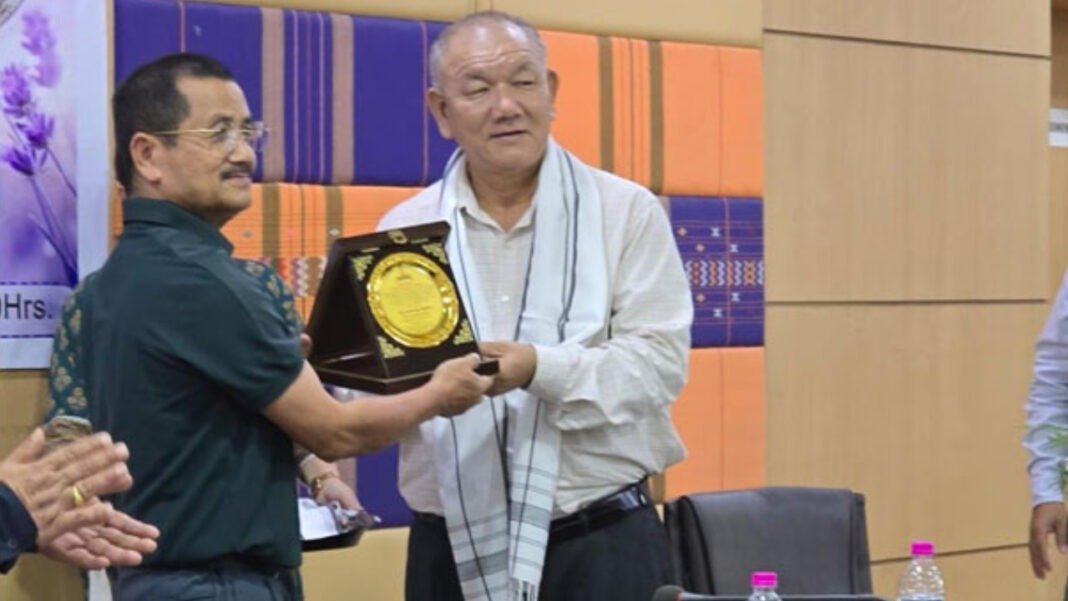HT Correspondent
NAHARLAGUN, Aug 5: After a distinguished career spanning nearly three decades, Dr Lobsang Jampa, the State Epidemiologist of Arunachal Pradesh, retired on July 31, leaving behind a legacy widely acknowledged as transformative for the state’s public health infrastructure.
A farewell ceremony in his honour was held at the Directorate of Health Services (DHS) in Naharlagun, where colleagues, dignitaries, and officials came together to celebrate his extraordinary service.
The ceremony was attended by Director of Health Services Dr Marbom Basar, Dr Komling Perme, and other senior officials of the Directorate.
Recalling his contributions with deep admiration, speakers described Dr Jampa as a pioneer and referred to him as the “Father of Public Health” in Arunachal Pradesh—a title that reflects both his groundbreaking work and the enduring impact he leaves behind.
Dr Jampa’s professional journey in the health sector stretched over 28 years and three months, marked by unwavering commitment and visionary leadership.
Appointed as State Epidemiologist in 1999, he led the state’s response to several major health crises, including the Avian Influenza outbreak of 2005, the Swine Flu episodes, and the COVID-19 pandemic.
His ability to coordinate response strategies, manage containment protocols, and raise public awareness earned him wide appreciation across government and medical circles.
His reputation for hands-on fieldwork was well established during the early 2000s, when he led disease surveillance and outbreak investigations in remote and inaccessible regions such as Parsiparlo, Sunpura, and Menchuka.
His dedication to reaching the state’s most underserved areas, often in the absence of proper road connectivity, stood as a testament to his commitment.
For his outstanding contributions, he was awarded the State Gold Medal on August 15, 2015.
In addition to his role in emergency health response, Dr Jampa was instrumental in systemic reforms.
He played a prominent role in advocating for the enhancement of the retirement age for government doctors to 62 years—a long-standing demand that was ultimately realised.
He worked closely on this matter with fellow senior doctors Dr Alok Yirang and Dr Pekba Ringu during the tenure of Satya Gopal, the then Development Commissioner.
Dr Jampa also contributed significantly to academic and scientific research in the state.
Under his leadership, multiple studies supported by the Indian Council of Medical Research (ICMR) were successfully conducted.
These included studies on Herpes Simplex and Hepatitis B screening in Anjaw district, the India Diabetes Study (2012 and its 2022–2023 follow-up), and research into Paragonimiasis—a little-known lung fluke disease prevalent in the region.
A firm believer in building robust public health infrastructure, Dr Jampa facilitated land acquisition for critical projects, including space for patients in Vellore and for the National Centre for Disease Control (NCDC) at Hollongi.
He oversaw the construction of a boundary wall to protect the NCDC site and spearheaded the setting up of the Health Emergency Operation Centre (HEOC) at TRIHMS in conformity with International Health Regulations (IHR) 2005.
Among his most forward-thinking contributions was his work in laying the foundation for the Public Health Cadre in Arunachal Pradesh.
The proposed cadre represents a significant structural reform aimed at improving governance and operational efficiency in the health sector.
Dr Jampa also played a critical role in implementing flagship health initiatives.
Under his guidance, 12 District Dialysis Units were established across the state under the Pradhan Mantri National Dialysis Programme (PMNDP), with three more units currently in progress.
He was also responsible for rolling out the Chief Minister Organ Transplant Scheme (CMOTS) in 2018, under which over 200 successful kidney transplants have been conducted so far.
In his tenure, he provided direct supervision and guidance to a wide array of national programmes including the National Programme for Prevention and Control of Non-Communicable Diseases (NP-NCD), Integrated Disease Surveillance Programme (IDSP), Health and Wellness Centres (HWC), National Programme on Climate Change and Human Health (NPCCHH), National Rabies Control Programme (NRCP), and the National Viral Hepatitis Control Programme, among others.
Colleagues and juniors remembered Dr Jampa as a man of vision and humility, known for his tireless work ethic and willingness to mentor the next generation of public health professionals.
His deep sense of duty, meticulous approach to health governance, and humane outlook made him a respected figure across institutions and communities.
As he retires upon attaining the age of superannuation at 62, the Department of Health Services expressed its deep gratitude to Dr Jampa for his invaluable contributions and extended warm wishes for a peaceful and fulfilling life ahead.
His departure marks the end of a remarkable chapter in the history of public health in Arunachal Pradesh—one that will continue to inspire future generations of health workers in the state.












